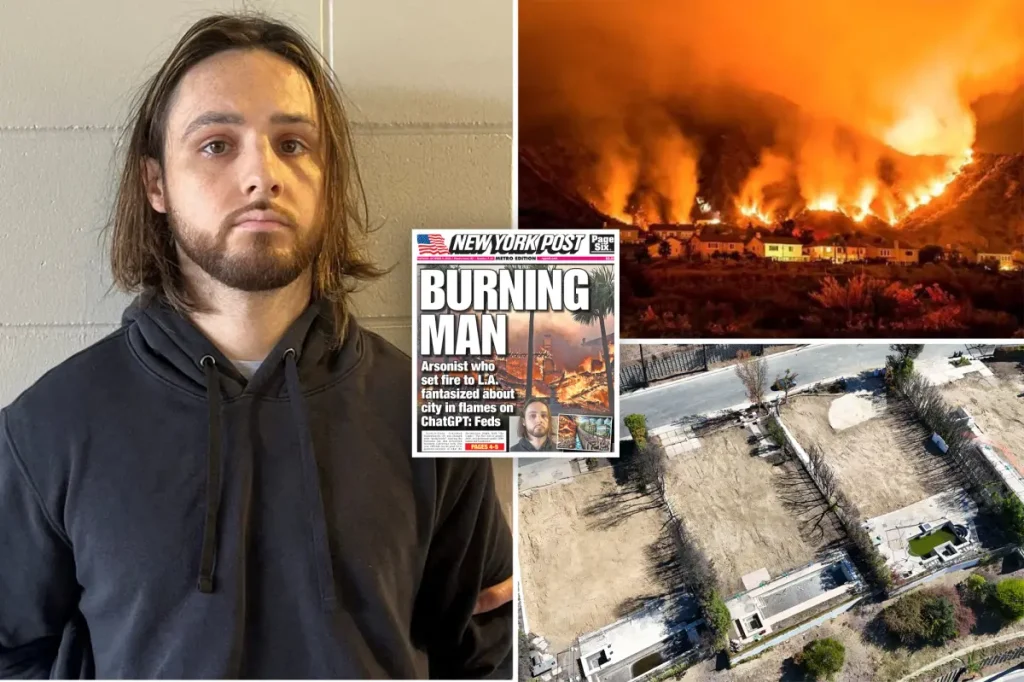Arsonist Suspect Faces Federal Charges in Devastating Palisades Fire Incident
Jonathan Rinderknecht, a 29-year-old man accused of igniting the catastrophic Palisades Fire in Los Angeles, made his first federal court appearance last Thursday, pleading not guilty to serious arson charges. The hearing took an unusual turn when Rinderknecht, shackled and dressed in tan jail attire, interrupted proceedings to question the judge about his detention status before his attorneys quickly intervened and briefly removed him from the courtroom. His attorney, Steven Haney—known for representing high-profile clients like Magic Johnson—later characterized Rinderknecht’s outburst as the understandable frustration of a “young man who is not really clear on why he is in jail.” Despite approaching 30 years of age, his legal team emphasized his confusion and emotional state, with Haney suggesting these reactions actually reinforced his belief in his client’s innocence, stating, “I kind of like to see that kind of emotion from a client; it makes me understand and feel that they truly believe they are innocent.”
The Palisades Fire resulted in devastating human and economic losses, destroying approximately 7,000 homes and businesses, causing an estimated $150 billion in damages, and claiming twelve lives. Federal prosecutors allege that Rinderknecht was residing in Los Angeles this January when he went to a popular hiking area in Palisades Hills and started a brush fire on New Year’s Day—while reportedly listening to rap music with lyrics about setting fires. According to authorities, he had been listening to these disturbing lyrics for days before the incident. After allegedly starting the fire, Rinderknecht called 911 to report the blaze but then returned to watch firefighters battle the flames, behavior prosecutors suggest shows a concerning fascination with fire. The defense team, however, challenges the government’s case, questioning why their client is being blamed for both the January 1st Lachman Fire and the Palisades Fire that erupted a week later, suggesting potential negligence by fire authorities.
The prosecution’s narrative describes a particularly troubling sequence of events. Though firefighters responded to the initial January 1st fire, they apparently failed to fully extinguish it. The flames reportedly continued to smolder underground for days before fierce winds caused them to erupt into the massive Palisades Fire that devastated Los Angeles for weeks, becoming one of the city’s most destructive blazes in recent memory. After the fire was finally contained, Rinderknecht relocated to Florida, where he was eventually arrested on October 8. He has since been held without bail and was recently extradited back to California to face charges that could result in up to 45 years of imprisonment if he’s convicted on all counts.
The case against Rinderknecht includes disturbing digital evidence that prosecutors say reveals an unhealthy obsession with fire. Investigators claim he used ChatGPT to generate an image of a burning city with crowds fleeing, and in conversations with the AI, allegedly stated he had “literally burnt the Bible” and that it “felt amazing.” This evidence seems to paint a picture of someone with potentially dangerous fire-related fixations. Adding to the complex portrait, newly released body camera footage obtained by Scripps News shows Rinderknecht being pulled over twice in Florida—once in August and again in September—for speeding violations during his time there following the fire. These incidents occurred shortly before his arrest and extradition to California.
Political and personal details have also emerged about Rinderknecht, who worked as an Uber driver. His social media history reportedly contains anti-Trump sentiments and posts about environmental concerns—a detail some might find ironic given the ecological devastation caused by the fire he’s accused of starting. Born in France, Rinderknecht now faces serious federal charges, including arson affecting property used in interstate commerce, destruction of property by means of fire, and timber set afire. His legal team, which includes both Haney and California-based attorney Jacob Gillick, continues to maintain that the federal case lacks sufficient evidence to tie him conclusively to both fire incidents, suggesting there may be questions about fire department protocols in the initial response.
The case has been scheduled for trial on December 16, with Rinderknecht due back in court on November 12 for preliminary proceedings. As the legal process unfolds, the communities affected by the Palisades Fire continue to recover from the immense destruction. The fire’s impact goes beyond the immediate damage figures, affecting ecosystems, displacing residents, and creating lasting trauma for those who lost loved ones. While Rinderknecht maintains his innocence through his not guilty plea, prosecutors are building their case around his alleged actions, statements, and digital footprint. This case highlights the devastating potential consequences of arson in drought-prone California, where wildfires have become increasingly destructive in recent years, and raises questions about both individual responsibility and the effectiveness of fire containment measures when initial blazes are reported.


